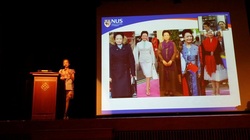 It was my great honor to be invited to make a spotlight presentation for the Chinese Internet Research Conference held at Hong Kong Polytech University this year! Thanks to David Herold, the organizers, and the steering committee for the flattering and daunting task! I still vividly remember that in 2007, I was also very fortunate to be given the top student paper when CIRC was held in Texas A&M hosted by Randy Kluver. Now seven years later, I ask myself what better I can offer to the community. I am not sure whether I have become a better researcher but at least, I am no longer alone. This time I have two fabulous collaborators, Dai Jia and Yang Tian, both from Tsinghua University. Their diligent working attitude and generous support have been the most critical reason why the paper is all possible. I opened the presentation with an example of China's current first lady, Peng Liyuan. While the international society sees Peng as the first ever Chinese first lady who can rival Obama's Michelle, many Chinese know Peng as a popular star. She has appeared in the first ever Spring Festival Gala and since then, her songs have been hits in China. Some media reports praise her for enhancing the national image by smiling and posing to the cameras. And for many Chinese, the fact that we know her, or her voice, so well has brought a sense of familiarity to the new leadership. Both the internal and external roles Peng has played in China's political life have every thing to do with her life of being a popular singer. I continued saying that this is definitely not just a Chinese case. The blurring boundary between popular culture and politics has been witnessed around the world. This observation has brought some scholars a great deal of uneasiness. Popular culture turns people from rational citizens to passive spectators, who watch their favorite stars preform but make no actions themselves. They may also become fanatic followers, who blindly do whatever their idols ask them to do. The fascination with celebrities makes citizens pay more attention to superficial qualities such as how one looks or how one speaks, and ignore the substantial criteria of being a politician such as experience, policy ideas, and visions. However, this worry is nothing new. As early as in the Ancient years in China, poets (popular singers at that time) already used poems (popular songs at that time) to mock and criticize the emperors and their empires. I argue that what we should worry about isn't whether popular culture is good or bad for politics (because politics is never simply good or bad). What we should worry about is why we still know so little about popular culture and politics, the endless seeking for pleasure, the strong desire for emotions, the structures of feeling! I argue that it is because our theoretical perspectives to examine politics are limited. One idealistic perspective sees everyday politics as deviant cases from the ideal model of democracy, such as rational debate indicated in Habermasian public sphere. Another realistic but a bit cynical perspective sees politics as power competition. It is all about exchange of interests (e.g., Bourdieu's theory of capitals). It is my argument that we should look at politics as performance. If we take this perspective, our focus is no longer on what is right and what is wrong. Politics is a matter of aesthetics and taste. We should ask, what is preferred, what is enjoyed, what is appreciated. We also would not see politics as a battle between the powerful and the powerless. How does the powerful repress the powerless, how does the powerless fight against the powerful. Instead, we talk about a relationship of performers vs. audiences. The dynamics of this relationship is much more subtle and complicated than simply being a competition among powers. Think about it: A show is not a show without audiences. If we see politics as performance, we may ask why celebrities want to perform politics. An obvious reason is to say celebrities use these political issues to keep their names in news. But why news? Why not the list of parliament members? It is because the importance of mediation is unprecedented nowadays. Although popular culture has always been a part of political communication, what marks our age is the extreme importance of mediation. We now have celebrities who are famous for being famous. They have no distinctive background, they have no outstanding achievement, they are not even pretty. Think about Furong Jiejie. What has made them so well known is the repeated exposure in media coverage. I concluded the theoretical part of this presentation with a research agenda, dictated by the perspective of politics as performance. I ask:
Although there is another methodological point I made about network analysis, I hope readers can stop at the theoretical points and think about how a perspective of politics as performance could inform our inquiry about Chinese Internet. A digital copy of the presentation is not posted in response to the conference audiences' concern of leaking privacy information of the celebrities and their followers. You are always welcome to write to me for the slides!
1 Comment
2013年年初发表在《中国传播学刊》的这篇文章,有幸受到了翻译社群的关注,得到了赵嘉敏(译言创始人)的转发。两个很有趣的网站,政见和北大新媒体也做了这个研究的分享。这些回应都符合我们做学术与现实结合的action research的初衷,在此表示感谢。
This meta-review has been published by Chinese Journal of Communication. See the link HERE. THe following would be some highlights of the books I found highly interesting to share. "Although Castells depicts the states as either oppressive or corrupt (under the influence of financial capital) in most instances, he rightly points out that "the outcome of the conflict (between the state and civil society, added by author) depends on the interplay between political interests in the country and geopolitical interests related to the country" (p. 97). When social activism reaches its most radical level as regime-overthrowing revolutions, states respond with most radical measures such as switching off the Internet in Egypt or extreme violence in Tunisia. However, the effects of such state responses vary across countries depending on the particular state's internal politics and its position in geopolitics. This analysis makes it clear that states are not independent powers and they have to exist in relation to global powers. Social activism, therefore, does not exist in relation to just a single government but to a network of powers." "Hoofd makes a compelling etymological analysis (pp. 6-8), showing that activism was originally coined by Rudolf Eucken as the ideology of energetic action to overcome the non-spiritual nature of human kind. This ideology was later applied to economic theories by Walter Eucken (son of Rudolf), who is deemed as “the predecessor of current neo-liberalism” (p. 7). According to Walter’s theory, the active attitude to life is essential for economies to counter depression. “Activism was an economic strategy originally employed for the benefit of the nation-state in which its citizens could supposedly enjoy the largest amount of ‘spiritual freedom’ through actively encouraged but closely monitored economic competition” (p. 7). The collusion between activism and neo-liberalism highlights the entangled relationship among civil society, state, and global capitalism. Hoofd suggests that social activism, despite its confrontational appearance, may have deep ideological connections with the network of powers." "A few chapters in Ford’s book highlight the problematic role of international NGOs and other global forces. Financial aid can lead to financial dependence, which allows international organizations’ peace-building programme to dictate the limits of local activists’ engagement in the peace movement in post-conflict Timor-Leste (Dibley, 2013). Appealing to international norms of human rights helps sexuality right activists in Malaysia to establish an alternative source of authority but invites heavy state sanction (Lee, 2013). Conflicts within the agendas of multiple international forces are made explicit in framing sex work as work vs. sex workers as victims of human trafficking in Cambodia (Sandy, 2013). Illustrating the entangled relationship between local and global politics, an important case is that a reprimand by the US Department of State on the Cambodian government was reported as an achievement of the Cambodian sex worker rights campaign. " Some of my ideas A network approach to examining social activism, I think, is appropriate, especially after knowing of the ideological connection between activism and capitalism that Hoofd argues. Instead of treating activism and capitalism as two separate processes, we should examine how social activism emerges, evolves, and diminishes in relation to the network of powers. Instead of seeing social activism single-directionally determined by neo-liberal capitalism, I would like to borrow the concept of “seduction” (Baudrillard, 1990) to describe the relationship between the two. I hereby use one example to illustrate the seducing relationship: Google is a company that makes profits based on searching through free and open content provided by Internet users and this profit-driven practice coincides with many activist appeals for freedom of expression or freedom of information flow. When Google exploits these causes and activists behind them, activists also try to demand moral or material support from Google to fulfill their goals, such as fighting against the state. It is hard to say who is in control and who is winning over whom. It is indeed a complicity suggested by Hoofd but the complicity goes both ways. What makes our research on social activism exciting is to make visible the rules, charms, snares, and lures involved in such seduction. 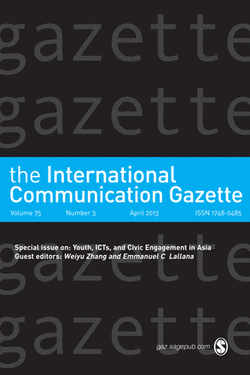 Our special issue on "Youth, ICTs and Civic Engagement in Asia" is published in International Communication Gazette!!! Thanks to my co-editor and project head Emmanuel Lallana, and dear collaborators Clarissa David, Mohammad Sahid Ullah, P. Vigneswara Ilavarasan, and Joanne Lim! Speical thanks to the editor, manager, and proofreader of this journal too. They are all so professional that this issue gets published smoothly and timely. Highly recommend my colleagues to submit to this journal! You can download the entire issue HERE! A table of content is found here.  Dhaka, Bangladesh Dhaka, Bangladesh The “Youth, ICTs, and Political Engagement in Asia” project spanned over three years from 2009 to 2012 and officially closed on November 15, 2012. The five-country (Singapore, Malaysia, Philippines, India, Bangladesh) comparative study was funded by International Development Research Center, Canada through ideacorp, the Philippines, after a competitive review process. A grant of SGD 170,000 was utilized to conduct 143 in-depth interviews and 41 focus group discussions. About 35 researchers were recruited, trained, and organized to contribute to this project. The project has been presented as a panel at the 19th Asian Media Information and Communication (AMIC) conference and the 2012 conference of International Association of Media and Communication Research (IAMCR). 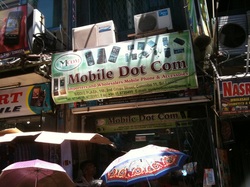 Colombo, Sri Lanka Colombo, Sri Lanka We have completed an administrative report on this three-year journey we have taken part in. The process has been anything but comfortable, expected, or business as usual. We took great pain in detailedly documenting this process and hope that our experience would add into the practical wisdom about working in this region. For example, one sad loss is that we were unable to sustain a research partnership in Sri Lanka, a country that I set my own feet in and has inspired me tremendously. Although this administrative report would not be counted in any research institutes as academic publications, it nevertheless provides a rare account of doing research in developing countries and its various challenges. If you are wondering how tough a researcher's job could be, please click here. 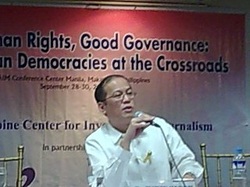 Noynoy Aquino Noynoy Aquino When the project started, Noynoy was still the son of Corazon and had little interest in contesting for the president. He was still free enough to participate in the anniversory event held by one of our Philippine partners. One blogger journalist asked a question about his hairstyle and he was not annoyed at all. Now the then fresh face in the Philippines politics became the 15th President. It is hard not to think that the young activists we have interviewed would become someone important enough to reset the trend and open up a new era of Asian history. One of our responsibilities is to articulate such potential based on what young activists themselves have told us and envisioned their future. Our Filipino collaborator, Dr. Clarissa David and I co-authored a short piece on the significant trends of digital activism among Asian youth and presented the findings at the CeDem Asia conference held in Singapore last year. Our presentation slides can be viewed here. The short reflection is now available online here. 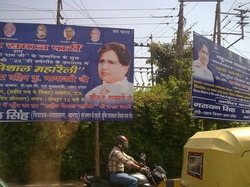 Delhi, India Delhi, India Last but not the least, our academic outputs are forthcoming as a special issue in International Communication Gazette. Each of the five countries produced a focused paper on the most salient aspects of youth activism through ICTs found in their country. You will expect to see them out in March/April this year. But we have done much more than the five papers. Each of the five countries also compiled a background report of the very basic information of the country, including youth population, ICT penetration rates, participation policies, media policies, youth policies, development of new media, and political culture and climate. These reports can be found here. Two pieces of facts caught my interest these days.
Fact 1: The recently revived Speaker's Corner in Hong Lim Park attracted two protesters on September 1st, its first day when restrictions were officially eased. Media reported that there were more audience than actors. Fact 2: Advisory Council on the Impact of New Media on Society released a consultation paper on August 29th, urging the Government to interact with Singaporeans via new media. When I watched news on Fact 1, I cannot stop thinking of Fact 2 and say, come on, because we have the Internet. Our speaker's corner nowadays is the cyberspace. Here is a commentary on the consultation paper. TODAYonline:Can Radical Also Be Right? In other words, if the Government wants to engage citizens in the new media as the report envisions, it cannot always set the agenda. This is quite radical, given that the Government’s prerogative to set the agenda has remained one of the fundamentals in Singapore since independence. The quote above is very interesting because it triggers my mental link between e-engagement and radical democracy. Radical democracy, according to Cohen & Fung, embraces two ideas: Participation and Deliberation. The news author is right to say e-engagement is radical because he realizes that e-engagement gives citizens direct roles in policy-making. The officials will have to respond to citizens' concerns rather than setting the agenda for them. However, the author more or less used radical as a negative word considering that he doubted the co-existence of radical and right. Cohen & Fung's definition implies that radical democracy definitely can be right because it is based on deliberation. So I think the real concern here is not whether e-engagement is radical or not. It is the problem of the tension between participation and deliberation. How does a public decision-making procedure become widely participatory and highly deliberate at the same time? Especially when the Government disagrees with its citizens on what is considered as deliberate. And when the citizens disagree with each other. |
Weiyu Zhang
I am an Associate Professor at Department of Communication and New Media, National University of Singapore. Categories
All
Archives
January 2019
|

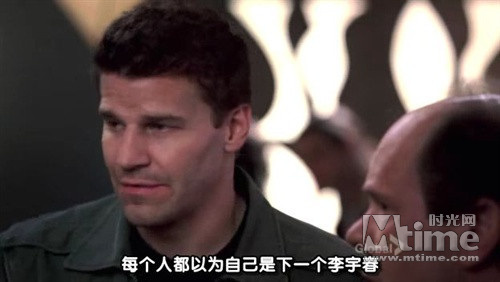
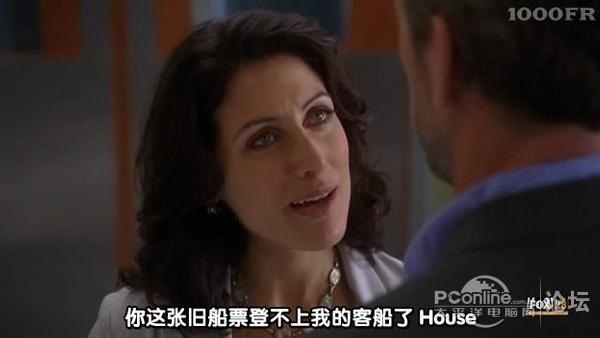
 RSS Feed
RSS Feed
